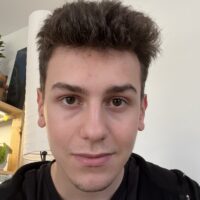My name is Marcus. I’m 16 years old and I live in Canada.
I started stuttering when I was around two or three years old, just as I began to speak. It was strange because my stutter came in phases—sometimes I could speak normally for months, then suddenly I would start stuttering on nearly every word. It was exhausting. When my parents divorced, I was going through one of those stuttering phases, and I never seemed to come out of it. As time passed, my stutter only got worse. I began to speak less and less—only when absolutely necessary. If a teacher or friend asked me something, I’d speak, but otherwise, I stayed silent.
Stuttering made me more shy and introverted. I felt like I didn’t have space to express myself. Whenever I spoke, I felt like I sounded disabled, like I had something wrong with me. It made me feel strange. For about five years, I kept telling myself I’d find a way to stop stuttering. I did research, but most of what I found was vague advice like “breathe through your belly.” Worse, many associations in Canada said stuttering couldn’t be stopped—you just had to accept it and be proud of it. But I didn’t believe that. When I was alone, I spoke perfectly fine. So why couldn’t I speak that way in front of others?
Then, earlier this year, my school held a science event called Exposcience, where students present a project to an audience. I had a few project ideas, but none were approved. When I told my mom, she suggested I do my project on stuttering. It clicked—I thought it was a great idea. I started researching more seriously. At school, someone introduced us to the BANQ (Bibliothèque et Archives Nationales du Québec), and I searched the word stutter. I found a 700-page book on the subject. I read 140 pages before diving into the project. Our teacher said if we wanted to do an experiment, we’d need a mentor. My friend suggested we test whether I could stop stuttering in four months—just in time for the presentation.
I emailed every speech therapist and stuttering association I could find. After two months, only one person replied—Lee. He couldn’t help directly but connected me with someone from WSSA who could: Coach Javier. We met over one or two months, starting in January and introduced me into this program and WSSA’s Neuroscience Method to Stop Stuttering. After just a few sessions, my stutter began to fade. I realized it really was possible. Javier taught me practical exercises. One was the Speech Plan – Short Link Stop. It was hard to use at first, but it helped a lot. Another was reading aloud before bed. Since I’m in an advanced school program, I already had a lot of material to study—so I just read my homework out loud.
I also learned about auto-suggestion, which surprisingly worked very well. The best affirmation I used was: “If I can say one word anywhere, anytime, I can say any word, anywhere, anytime.” That sentence helped rewire my thinking. It gave me confidence. One of the hardest—but most helpful—techniques was simply speaking slowly. That alone helped reduce pressure and made a big difference.
When it was time to present at Exposcience, everything came together. My speech was fluent. People loved our project. A well-known science communicator in Quebec even made a Facebook post about us and gave us a prize. Unfortunately, our project didn’t advance to the next level. A university scientist told us our experiment wasn’t valid because it was only tested on me. We missed qualifying for regionals by just 0.5%. That was disappointing—but all the other judges loved our work. My parents were proud. My friends were amazed I had stopped stuttering.
Even though we didn’t “win,” I felt like I did. I learned so much. Before, I was stuttering every five words. Now, I can speak fluently. During the presentation, I spoke non-stop for days and started actually enjoying it. Next year is my last year of secondary school, and I want to go further. I’ll redo the project—but this time with more people who stutter. I want to prove it’s really possible to stop. I want to challenge the idea that stuttering can’t be overcome. Because that belief simply isn’t true.
While we were presenting, people who stuttered—or who knew someone who did—told us it was inspiring. Some even started trying the tips, like reading before bed. That made me feel like maybe I helped someone. That meant a lot. Now, I enjoy speaking. I talk to teachers, strangers—even people I don’t know. I don’t feel like I’m speech-disabled anymore.
I still get nervous in some situations, like talking in front of big crowds, but is has been several months since I got stuck on a word. I’m still working on my speech. Now, my goal is to love speaking in every situation, not just the easy ones. Thanks to this program I have stopped stuttering. So can you.
Marcus, Canada – July 2025

